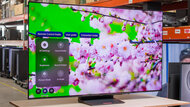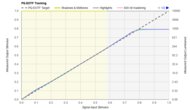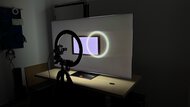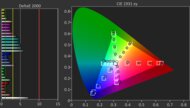With $2,000, you can buy yourself some of the best TVs on the market, packed with features so that you don't have to make compromises, no matter your usage. It all boils down to what you want and how you use your TV, and finding the best TV in this price range for your needs depends on how you plan to use it. If you mostly watch TV in your living room with big windows and a lot of natural sunlight, you're going to need a TV with solid reflection handling that gets bright enough to overcome glare, so you're likely going to want a higher-end LED model. However, if you're mostly watching movies or shows in a dedicated home theater with the lights dimmed or completely off, an OLED will be more suitable due to the unbeatable contrast ratios. For gamers looking to take advantage of their modern consoles or PCs, advanced gaming features like HDMI 2.1 bandwidth, 4k @ 120Hz (or 144Hz), and VRR are very important.
By putting dozens of TVs a year through our in-depth testing process, we can objectively recommend what TVs are the best choice depending on your budget and usage. Below are our recommendations for the best TVs under $2,000 that you can buy. You can also check out our picks for the best 80-83-85-inch TVs, the best 4k TVs, and the best budget TVs, or vote on which TVs you want us to buy and test. To learn more about the 2025 TV landscape, check out our 2025 TV lineup page.

We buy and test dozens of TVs yearly, taking an objective, data-driven approach to deliver results you can trust. Our testing process is complex, with hundreds of individual tests that take over a week to complete. Most of our tests are done with specially designed test patterns that mimic real content, but we also use the same sources you have at home to ensure our results match the real-world experience. We use two main tools for our testing: a Colorimetry Research CR-100 colorimeter and a CR-250 spectroradiometer.
-
Best TV Under $2,000
 Mixed Usage8.6Home Theater8.8Bright Room7.6Sports8.1Gaming9.1Game Mode Responsiveness9.4Brightness8.0Black Level10Color8.8Processing (In Development)8.4Resolution4kNative Refresh Rate144HzScreen FinishGlossyPanel TypeOLEDSub-TypeQD-OLEDSee all our test resultsDolby VisionNo
Mixed Usage8.6Home Theater8.8Bright Room7.6Sports8.1Gaming9.1Game Mode Responsiveness9.4Brightness8.0Black Level10Color8.8Processing (In Development)8.4Resolution4kNative Refresh Rate144HzScreen FinishGlossyPanel TypeOLEDSub-TypeQD-OLEDSee all our test resultsDolby VisionNoThe best TV under $2,000 we've tested is the Samsung S90F OLED. It's an incredible TV with fantastic picture quality. It uses QD-OLED technology, delivering a perfect dark-room experience, with deep, inky blacks and no distracting haloing around bright areas of the screen. Furthermore, the colors are bright and vibrant, so it's an amazing TV for watching the latest films in HDR. Plus, the built-in Tizen OS smart interface is easy to use and has a great selection of streaming apps and games. It doesn't support the widely used Dolby Vision HDR standard, but it does have Samsung's similar HDR10+. It even has a super wide viewing angle, so image quality doesn't degrade when viewed from the sides of the screen, making it great for large living rooms.
It's a fantastic TV for gamers looking to get the most out of their new Xbox Series X, PS5, or recent gaming GPU, as all four of its HDMI ports support 4k @ 144Hz gaming and VRR technology to reduce screen tearing. Furthermore, motion blur is almost non-existent due to its nearly instantaneous pixel transitions. The TV is bright enough in SDR and has the reflection handling needed for a room with some overhead lights on. Overall, it's the best 65-inch TV under $2,000 you can buy, but if you're in a room with multiple windows and usually watch TV during the day, consider the Samsung QN90F. In some regions, the S90F doesn't have a QD-OLED panel.
-
Best Bright Room TV Under $2,000
 Mixed Usage8.2Home Theater8.1Bright Room8.7Sports8.5Gaming7.8Game Mode Responsiveness7.8Brightness9.0Black Level8.3Color7.7Processing (In Development)7.7Resolution4kNative Refresh Rate165HzScreen FinishMattePanel TypeLCDSub-TypeVASee all our test resultsDolby VisionNo
Mixed Usage8.2Home Theater8.1Bright Room8.7Sports8.5Gaming7.8Game Mode Responsiveness7.8Brightness9.0Black Level8.3Color7.7Processing (In Development)7.7Resolution4kNative Refresh Rate165HzScreen FinishMattePanel TypeLCDSub-TypeVASee all our test resultsDolby VisionNoIf you're not in a dark room, the benefits of the Samsung S90F OLED aren't as noticeable, so you'll want to get an LED TV with higher peak brightness, like the Samsung QN90F. It's a fantastic choice for a bright living room thanks to its matte screen coating and superb peak brightness, so glare isn't an issue. Although it looks good in a dark room due to its fantastic local dimming, there's more noticeable haloing around bright objects than on the S90F. Still, it delivers incredible picture quality, with vibrant and lifelike colors that are sure to impress. Unfortunately, like all Samsung TVs, it doesn't support Dolby Vision or DTS audio formats. Although its viewing angle is wider than most LED models and makes the TV suitable for watching content with a small group, it's still not wide enough for large group settings, as the image degrades when viewed from more aggressive angles.
It has a great selection of gaming features, including VRR and HDMI 2.1 bandwidth on all four HDMI ports. It even supports up to 4k @ 165Hz, so you're covered if you have a modern console or want to take advantage of your powerful PC. There's more noticeable motion blur than the Samsung OLED due to the TV's slower response time, but it's still fast enough that you won't be distracted by a smeary-looking image. You can only get the 55-inch model for under $2,000 when not on sale, but you can find the 65-inch model for less than $2,000 during sales.
-
Best Mid-Range TV Under $2,000
 Mixed Usage8.4Home Theater8.6Bright Room8.4Sports8.3Gaming8.4Game Mode Responsiveness8.0Brightness9.1Black Level9.2Color8.0Processing (In Development)7.8Resolution4kNative Refresh Rate144HzScreen FinishGlossyPanel TypeLCDSub-TypeVASee all our test resultsDolby VisionYes
Mixed Usage8.4Home Theater8.6Bright Room8.4Sports8.3Gaming8.4Game Mode Responsiveness8.0Brightness9.1Black Level9.2Color8.0Processing (In Development)7.8Resolution4kNative Refresh Rate144HzScreen FinishGlossyPanel TypeLCDSub-TypeVASee all our test resultsDolby VisionYesThe TCL QM8K is the best 75-inch TV under $2,000 you can buy. It's not as good in a bright room as the Samsung QN90F, since it doesn't handle reflections as well. With that said, it still has decent reflection handling overall and is very bright, so as long as you don't have a very bright light source placed opposite the screen, glare isn't an issue. Fortunately, the TV is better than the QN90F in almost every other way. It shows deeper blacks with less haloing, displays a wider range of punchy colors, and displays brighter highlights in HDR content, so it has great image quality overall, especially in darker rooms. It even supports the popular Dolby Vision and passes through DTS audio formats, making it great for physical media enthusiasts. Unfortunately, its viewing angle is even narrower than the QN90F, so it's not a great choice if you have seating off to the sides of the screen.
Not only does this TV have great image quality, but it's loaded with a ton of modern gaming features. It has two HDMI 2.1 ports capable of 4k @ 144Hz and 1080p @ 288Hz gaming, with VRR support, making it a great option for consoles and PC gamers alike. It doesn't have the same speed of pixel transitions as an OLED, but it's faster than most similar Mini LED models, so you don't have to deal with too much motion blur.
-
Best Lower Mid-Range TV Under $2,000
 Mixed Usage7.8Home Theater7.9Bright Room8.0Sports7.9Gaming7.8Game Mode Responsiveness8.0Brightness7.8Black Level8.4Color7.5Processing (In Development)7.7Resolution4kNative Refresh Rate144HzScreen FinishGlossyPanel TypeLCDSub-TypeVASee all our test resultsDolby VisionYes
Mixed Usage7.8Home Theater7.9Bright Room8.0Sports7.9Gaming7.8Game Mode Responsiveness8.0Brightness7.8Black Level8.4Color7.5Processing (In Development)7.7Resolution4kNative Refresh Rate144HzScreen FinishGlossyPanel TypeLCDSub-TypeVASee all our test resultsDolby VisionYesIf you like what the TCL QM8K offers, but want something bigger than a 75-inch, go with the TCL QM7K. You obviously have to make some sacrifices by going with a model that's a step down in TCL's lineup, but you still end up with very good picture quality and the same set of features. While it's a bit dimmer than the QM8K, it's still bright enough to handle glare in well-lit rooms, as long as you don't have direct light sources facing the screen. Black levels aren't quite as good, but blacks still look bold and impressive, especially in darker environments, though there's a bit more haloing around highlights and subtitles. The TV isn't as bright as the QM8K in HDR, but it still delivers bright highlights that stand out well enough for an impactful HDR experience, especially when paired with its vibrant colors. Its viewing angle is just as narrow, so it's best to sit directly in front of the screen for the best experience.
On top of its solid image quality, this model offers the same suite of modern gaming features. With two HDMI 2.1 ports, support for 4K @ 144Hz, 1080p @ 288Hz, and VRR, it's a great choice for both console and PC gamers. It also supports Dolby Vision and DTS audio passthrough, so you're set if you have a physical media collection. If you're looking for an option that delivers solid performance and a wealth of features without breaking the bank, the QM7K is the best 85-inch TV under $2,000 available.
-
Best Budget TV Under $2,000
 Mixed Usage7.1Home Theater7.2Bright Room7.0Sports7.1Gaming7.2Game Mode Responsiveness7.9Brightness6.5Black Level7.6Color7.2Processing (In Development)7.0Resolution4kNative Refresh Rate144HzScreen FinishGlossyPanel TypeLCDSub-TypeVASee all our test resultsDolby VisionYes
Mixed Usage7.1Home Theater7.2Bright Room7.0Sports7.1Gaming7.2Game Mode Responsiveness7.9Brightness6.5Black Level7.6Color7.2Processing (In Development)7.0Resolution4kNative Refresh Rate144HzScreen FinishGlossyPanel TypeLCDSub-TypeVASee all our test resultsDolby VisionYesIf you're on a strict budget or want the largest TV you can get under $2,000 that still has good image quality, go with the TCL QM6K. You can regularly find the 98-inch model for just under $2,000 when on sale, which is a great deal. Even though it doesn't quite match the image quality of the higher-end models, it still delivers an impressive picture that's sure to impress. Colors are a bit more muted than they are on the more expensive TCL models, but they're still vibrant enough to avoid looking washed out. Blacks aren't as bold, but since the TV has a solid local dimming solution, blacks are still deep enough to give solid depth to the image, especially for a budget-friendly option. It gets bright enough in SDR to handle glare in well-lit rooms. However, its lower HDR brightness means highlights don't stand out as much as they should in HDR content. That said, it still provides a decent HDR experience overall.
This TV has the same set of gaming features that are found in its more expensive counterparts, including two HDMI 2.1 ports, support for 4K @ 144Hz, 1080p @ 288Hz, and VRR. Dolby Vision is also included, and it supports DTS audio passthrough, so it's great if you collect 4k Blu-rays. While the image quality isn't the same level as the TCL QM7K and TCL QM8K, a 98-inch model will certainly be a standout in your home theater. As with other TCL models, the viewing angle is on the narrow side, so sitting directly in front of the screen will give you the best image quality.
Notable Mentions
-
LG C5 OLED:
The LG C5 OLED is an alternative to the Samsung S90F OLED. The LG handles more glare in a bright room and offers Dolby Vision, but the Samsung offers superior brightness in its dedicated gaming mode and displays punchier colors,
making it the better option overall.
See our review -
LG B5 OLED:
The LG B5 is a good alternative to the TCL QM8K if you don't need a super-bright TV. The LG offers crisper motion, making it better for gamers. The LG also offers a much wider viewing angle, so it's more well-suited for large living rooms. However, the TCL is more well-rounded due to its superior brightness and wider set of features, so it's the better TV for a variety of usages.
See our review -
Hisense U75QG:
The Hisense U75QG is a good alternative to the TCL QM7K if you need a brighter model. However, the TCL is the better TV overall due to its crisper motion, better black levels, support for 1080p @ 288Hz, and more accurate PQ EOTF tracking.
See our review -
Hisense U65QF:
The Hisense U65QF is a brighter alternative to the TCL QM6K, but it doesn't perform as well as the TCL overall. The TCL offers superior black levels, better accuracy, lower input lag, and 1080p @ 288Hz, so it's the more complete package overall.
See our review
Recent Updates
Nov 13, 2025:
We reviewed the article and confirmed the accuracy of our picks.
Aug 15, 2025:
We replaced the Samsung S90D with the Samsung S90F as our top pick, the Samsung QN90D with the Samsung QN90F in the 'Best Bright Room' category, and the LG B4 OLED with the TCL QM8K in the 'Best Mid-Range' category. We also replaced our 'Best Budget Mid-Range' category with a 'Best Lower Mid-Range' category, our 'Best Cheap' category with a 'Best Budget' category, and dropped the 'Best Upper Mid-Range' category since our top two picks are already upper mid-range models. Finally, we refreshed the Notable Mentions section with more comparable alternatives.
Feb 20, 2025:
We added a link to our 2025 TV Lineup page and confirmed that our current picks are still valid.
Nov 27, 2024:
We rewrote the introduction to add some additional information, refreshed some text throughout, and added the Sony BRAVIA 8 OLED to the Notable Mentions.
Sep 12, 2024: Replaced the Sony X93L/X93CL with the Samsung QN90D/QN90DD QLED in the 'Best Bright Room TV Under $2,000' category. We also replaced every other pick with their 2024 successors due to availability and refreshed the Notable Mentions.
All Reviews
Our recommendations above are what we think are currently the best TVs under $2,000 to buy for most people. We factor in the price (a cheaper TV wins over a pricier one if the difference isn't really worth it), feedback from our visitors, and availability (no TVs that are difficult to find or almost out of stock everywhere).
If you'd like to do the work of choosing yourself, here's the list of all our TV reviews for models under $2,000. Be careful not to get too caught up in the details. While no TV is perfect, most TVs are great enough to please almost everyone, and the differences are often not noticeable unless you really look for them. Also, our scores aren't comparable across different test benches, so most of the older TVs in the list below score higher than they would today.




















